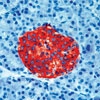EBV Targeted T-Cell Program (EBV-CTL)
The Epstein-Barr virus (EBV) is a ubiquitous virus that causes infectious mononucleosis in people with normal immune function; however, in immunocompromised patients such as those undergoing hematopoietic cell or solid organ transplants, it can cause lymphoma and other cancers. EBV-CTLs are a third-party, donor-derived, “off-the-shelf” T-cell product candidate designed to target and destroy EBV-infected lymphoma cells.
In February 2015, the US Food and Drug Administration granted breakthrough therapy designation for EBV-CTL in the treatment of patients with rituximab-refractory, EBV-associated lymphoproliferative disease (EBV-PTLD) following allogeneic hematopoietic cell transplant (alloHCT). AlloHCT is a transplant of bone marrow stem cells from one person to another as a means to treat a variety of serious diseases, primarily blood cancers.
Science
- EBV-PTLD Following Hematopoietic Stem Cell Transplant (alloHCT) and Solid Organ Transplant (SOT)
- Mechanism of Action
- Publications and Oral Presentations
EBV-PTLD FOLLOWING ALLOHCT AND SOT
In immunocompromised patients, EBV causes lymphomas and other lymphoproliferative disorders, collectively called EBV-PTLD. In clinical trials that enrolled patients with EBV-PTLD following HCT or SOT, efficacy following treatment with EBV-CTL compares favorably with historical data in these patient populations. In rituximab-refractory patients with EBV-PTLD after HCT, treatment with EBV-CTL resulted in one-year overall survival of approximately 60% in two separate clinical trials in comparison with historical data where median survival, or the time by which 50% of patients had died, was 16-56 days. In the setting of rituximab-refractory EBV-PTLD after SOT, similar results were observed, with one-year overall survival of approximately 60% in EBV-CTL-treated patients in comparison with an expected historical one-year survival of 36% in patients with high risk disease similar to the patients treated in the trials. In February 2015, the U.S. Food and Drug Administration, or the FDA, granted breakthrough therapy designation for EBV-CTL in the treatment of rituximab-refractory EBV-PTLD after HCT. Breakthrough therapy designation is an FDA process designed to accelerate the development and review of drugs intended to treat a serious condition when early trials show that the drug may be substantially better than current treatment.
MECHANISM OF ACTION
In normal individuals, a key T-cell function is ongoing suppression of EBV to maintain EBV viral latency. This virus is always present in the body after initial infection. Immunocompromised patients lack sufficient T-cells to control the virus. EBV-CTLs provide the immunocompromised patient with T-cells designed to recognize and target EBV-infected cells.
PUBLICATIONS AND ORAL PRESENTATIONS
Barker JN, Doubrovina E, Sauter C, Jaroscak JJ, Perales MA, Doubrovin M, Prockop SE, Koehne G and O’Reilly RJ. Successful treatment of EBV-associated post-transplantation lymphoma after cord blood transplantation using third-party EBV-specific cytotoxic T lymphocytes. Blood. 2010; 116(23):5045-5049 (Citation)
Doubrovina E, Oflaz-Sozmen B, Prockop SE, Kernan NA, Abramson S, Teruya-Feldstein J, et al. Adoptive immunotherapy with unselected or EBV-specific T cells for biopsy-proven EBV+ lymphomas after allogeneic hematopoietic cell transplantation. Blood. 2012; 119(11):2644-56 (Citation)
Fox CP, Burns D, Parker AN, Peggs KS, Harvey CM, Natarajan S, et al. EBV-associated post-transplant lymphoproliferative disorder following in vivo T-cell-depleted allogeneic transplantation: clinical features, viral load correlates and prognostic factors in the rituximab era. Bone Marrow Transplantation.2014; 49:280-6 (Citation)
Uhlin M, Wikell H, Sundin M, Blennow O, Maeurer M, Ringden O, et al. Risk factors for Epstein-Barr virus-related post-transplant lymphoproliferative disease after allogeneic hematopoietic stem cell transplantation. Haematologica. 2014; 99(2):346-52. (Citation)
Prockop, S. et al. Epstein-Barr virus-specific cytotoxic T lymphocytes for treatment of rituximab-refractory Epstein-Barr virus-associated lymphoproliferative disorder. Abstract CT107. Presented on April 19th, 2015 at the American Association for Cancer Research Annual Meeting 2015, Philadelphia, PA. (Citation)
Prockop, S. et al. Banked EBV-specific T-cells from HLA-partially matched normal donors to induce durable remissions of rituximab refractory EBV+ B-cell lymphomas post hematopoietic and organ allografts. J Clin Oncol 33, 2015 (suppl; abstr 10016). Presented on June 1st, 2015 at the 2015 American Society of Clinical Oncology Annual Meeting 2015, Chicago, IL. (Citation)
关于我们
Wolcavi Biotech致力于干细胞免疫治疗、分子生物学 、免疫学、体外诊断等相关领域的实验需求产品开发和销售。主要产品有抗原抗体|无血清培养基|细胞培养耗材并代理销售Abcam、Invitrogen(Gibco)、Roche、Sigma、R&D、Meridian等二十多家国外知名品牌。
联系我们
- 北京市通州区金桥科技园景盛南二街12号纳特园区
- Phone: +86 010 8646 3560
- Email: info@wolcavi.com










